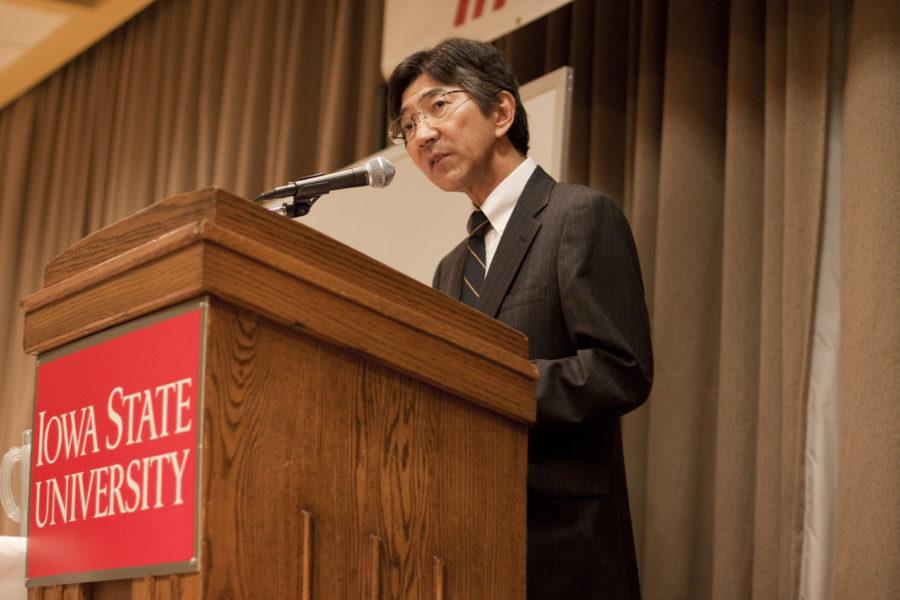Japanese diplomat discusses world economics at Iowa State
Photo: Huiling Wu/Iowa State Daily
Kazuhide Ishikawa, deputy chief of Mission at the Embassy of Japan in Washington, D.C., gives the lecture “Whither the Global Economy” on Tuesday, in the Sun Room of Memorial Union. Ishikawa’s lecture covered the future of global economy with emphasis on positives and negatives of the Asian markets.
October 26, 2010
Japanese diplomat Kazuhide Ishikawa spoke as a featured guest lecturer for the ninth annual Manatt-Phelps Lecture in the Memorial Union on Tuesday.
His lecture focused on the economic status of Japan, its relationship to the United States and how global economic issues are being addressed.
“While the entire world is a part of this economic crisis, it is important to focus on the positive,” said Ishikawa, deputy chief of mission at the Japanese Embassy in Washington, D.C. “For example, Japan is still number one in electronics industries as well as number in patent applications, which means that perhaps new technologies will become available in Japan to help us with productivity.”
During the last few years, the yen, Japan’s currency, value increased to 81 yen to the dollar.
Ishikawa said some of Japan’s economic problems outside of the world’s economic crises include large government debt as well as the aging population combined with decreasing population growth.
“The economy has also been passed by China for the first time in history,” Ishikawa said. “There are also very few women in the labor force, which means that we may need to consider a change in our social infrastructure to restore our level of productivity.”
Japan and the United States have had a strong economic relationship for many decades now. Japan is the third largest customer of agriculture products of the US, behind only Mexico and Canada.
Iowa, in particular, has had a healthy connection to Japan. Iowa is responsible for much of Japan’s swine industries, after a group of hogs were flown to Japan to restore that aspect of its economy after being hit by two typhoons in 1950, Ishikawa said. Today, 10 percent of Iowa’s exports go to Japan, and a vast majority of Japan’s swine have ancestry with that first group of Iowa hogs.
“Relations with the United States [and Japan] are very, very good,” Ishikawa said. “We are learning much about fixing our own economy from the United States’ efforts. We are implementing new policies to help establish a financial safety net, and next year we will be incorporating our own stimulus package into our budget.”
“More importantly, we share values,” Ishikawa said. “Not just economically, but all new challenges. It is important that we continue to work together in these endeavors.”
“What we need to figure out is how to manage overheating economies without overkilling it,” Ishikawa said. “It is important that world leaders come together to discuss these issues, with organizations such as the G7, focusing on the most developed countries in an economic sense, and the G20, focusing on nations in all stages of economic development.”
Despite the many problems the world’s economy is facing, Ishikawa believes there is hope for a brighter future.
“Much progress is being made today,” Ishikawa said. “It is believed that the trough of the economic crisis was in 2009, and now things are starting to look up. At this current rate of economic growth, we should be seeing ourselves returning to the pre-crisis economic level during 2011.”







